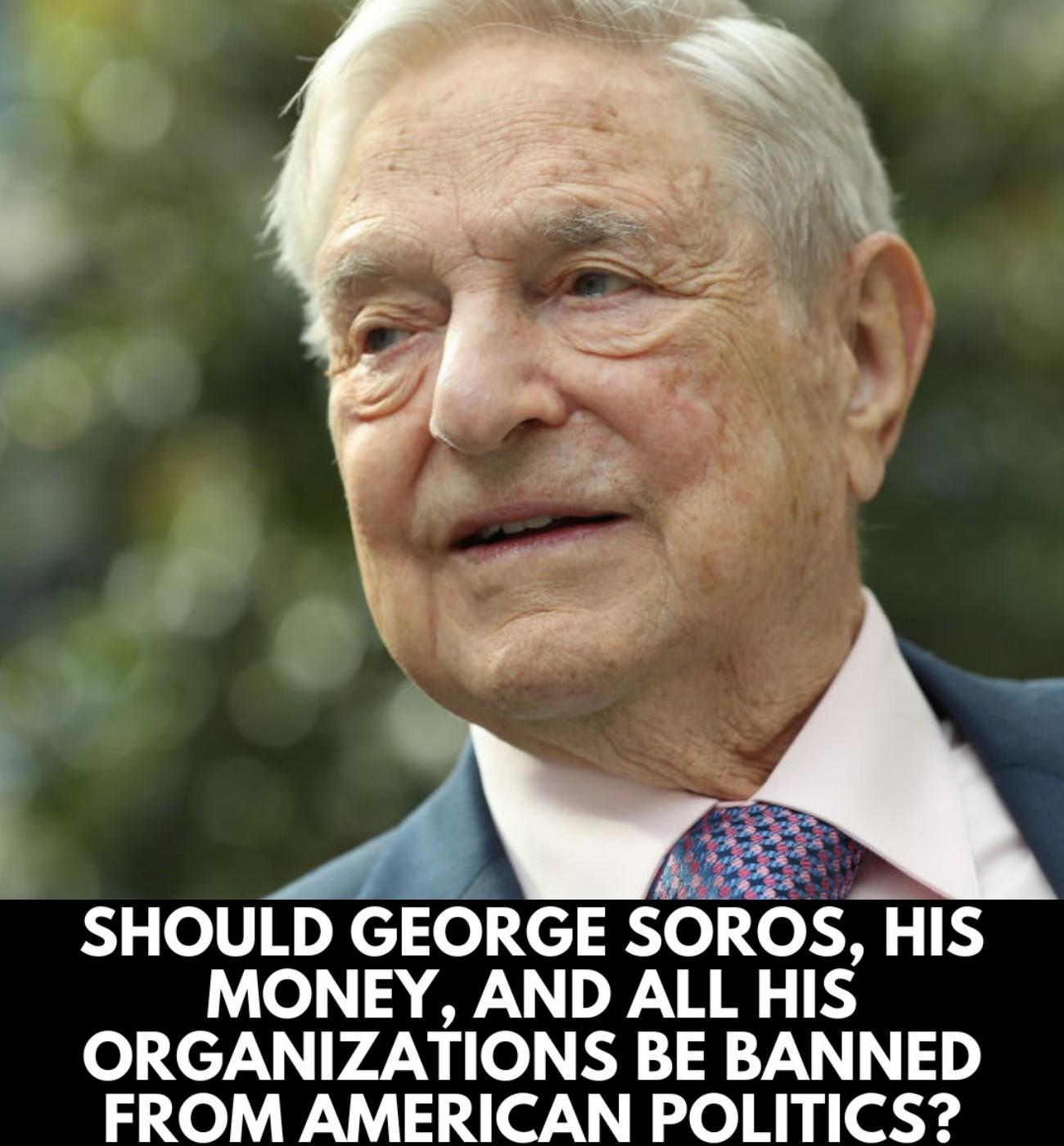
In the complex world of American politics, few names stir up as much debate as George Soros. A billionaire investor, philanthropist, and political activist, Soros has become a symbolic figure in discussions about the role of wealth in democracy. His involvement in political campaigns, social movements, and global humanitarian initiatives has earned him both praise and intense criticism.
The image of George Soros often surfaces in political conversations, accompanied by bold claims and provocative questions—like the one posed in a recent viral caption: “Should George Soros, his money, and all his organizations be banned from American politics?” This question taps into a deeper debate over money in politics, free speech, and the boundaries of influence in a democratic society.
Who Is George Soros?
George Soros is a Hungarian-American investor and philanthropist, best known for his success in financial markets and for founding the Open Society Foundations, which support civil society groups around the world. His philanthropic donations have reached over $30 billion, with significant funds directed toward education, human rights, democracy promotion, and criminal justice reform.
In the United States, Soros is most recognized for supporting progressive causes and Democratic candidates. He has invested heavily in criminal justice reform, immigrant rights, climate policy, and efforts to counter authoritarianism. His financial contributions to political action committees (PACs) and nonprofit organizations have made him a central figure in discussions about billionaire influence in electoral politics.
The Controversy Over Political Donations
The primary concern raised by critics is not that George Soros is wealthy—it’s how he uses that wealth to influence public policy and elections. This is a concern shared by critics of other wealthy donors on both sides of the political spectrum. When billionaires can pour millions into political races, does it distort the democratic process?
Soros’s opponents argue that his financial influence promotes radical social change, undermines traditional values, and disproportionately affects local and national elections. In particular, his funding of progressive prosecutors has sparked nationwide debate, especially in cities dealing with rising crime rates.
However, supporters of Soros argue that he is simply exercising his right to support causes he believes in—just like conservative billionaires who donate to right-wing candidates or institutions. They emphasize that Soros’s philanthropy has helped millions around the world, supporting free press, education, LGBTQ+ rights, and democracy in post-communist countries.
The Legal Landscape of Political Spending
Under current U.S. law, individuals and organizations are allowed to make political donations within specific limits. The Supreme Court’s Citizens United v. FEC decision in 2010 dramatically expanded the rights of corporations and individuals to spend unlimited amounts on political campaigns, as long as it’s done independently from the candidates’ campaigns.
This ruling created the rise of Super PACs, which can raise and spend unlimited funds. George Soros operates within this legal framework, just like any other donor. Therefore, any attempt to ban him or his organizations from participating in politics would face significant constitutional challenges—particularly under the First Amendment, which protects freedom of speech and political expression.
Is Banning One Individual the Solution?
The suggestion of banning George Soros and his organizations from American politics raises difficult ethical and constitutional questions. Would banning Soros mean banning all wealthy donors? If so, how would that apply to figures like Charles Koch, Elon Musk, or Rupert Murdoch? If not, does targeting Soros alone set a dangerous precedent of selective censorship?
Moreover, regulating the influence of money in politics requires comprehensive campaign finance reform—not targeting individuals. Transparency, donation caps, and reforming Super PACs are strategies that can help reduce outsized influence while preserving democratic rights.
Why Soros Is Often a Target
One of the reasons George Soros receives disproportionate attention is because of his visibility and political alignment. As a progressive billionaire who funds civil liberties and left-leaning causes, Soros is seen as a political counterbalance to conservative donors. This has made him a lightning rod for criticism, often framed in exaggerated or conspiratorial terms.
Unfortunately, many false and misleading claims about Soros have circulated online, sometimes laced with antisemitic overtones. While it is entirely fair to question the role of money in politics, it’s equally important to approach the conversation with facts, context, and respect for democratic norms.
What the Public Really Wants
Polls consistently show that Americans—regardless of political affiliation—are deeply concerned about the influence of money in politics. Many believe that the system favors the wealthy and that regular citizens don’t have enough voice. This concern isn’t limited to George Soros or any one individual.
The real issue isn’t just Soros. It’s the broader question: Should billionaires—on the left or right—be able to spend unlimited amounts to shape elections and public policy?
Solving this requires action from lawmakers, not vilification of individuals. Campaign finance reform, increased transparency, and voter empowerment are all part of the path forward.
Conclusion
The viral question about George Soros and whether he should be banned from American politics reflects a larger tension in modern democracy: the power of wealth versus the power of the people. Whether you support or oppose Soros’s political vision, the solution isn’t censorship or exclusion. It’s systemic reform, built on fair rules, equal voice, and a shared respect for democratic principles.
If you care about the future of American democracy, it’s time to move the conversation from personalities to policies. What kind of political system do we want to build? One dominated by billionaires—or one that truly represents the people?




